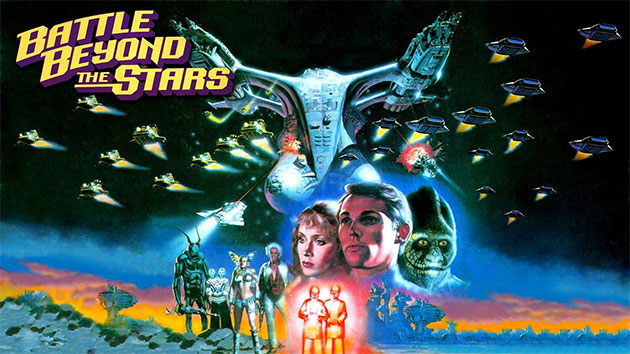Composer James Horner, who died yesterday in a plane crash near Santa Barbara, was well known as the man behind some of the most famous music in contemporary cinema. A 10-time Oscar nominee, he took home two Academy Awards in 1998 for his work on Titanic, including the music for the hit Celine Dion song "My Heart Will Go On."
But Horner has a long history in the movies, including a number of films with less sterling reputations among the cognoscenti. (Humanoids from the Deep, anyone?) He started composing scores for feature films when he was in his mid-20s, and by the early 1980s, he was a prolific composer of music for genre films, beginning with titles from Roger Corman's New World Pictures, which re-used his music in later productions. A good example of his early work is this lively martial theme for Battle Beyond the Stars.
Horner took some grief over his career for reusing musical tropes, such as variations on the "danger motif" you can hear hinted at in the clip above, and beginning at about 2:48 in this passage from Star Trek II: The Wrath of Kahn.
Picking on Horner for this kind of thing became an armchair hobby for a certain indignant faction of film-music fans who traced its provenance to Rachmaninoff — but Horner's approach seemed perfectly suited for the high adventure of what Star Trek series creator Gene Roddenberry once referred to as Horatio Hornblower in space.
Anyway, Horner could move in completely different directions when necessary, as he did when he swiveled cleanly and wrote this evocative, R&B-inflected cue for quintessential 80s urban cop drama 48 Hrs.
This is a modal window.
Beginning with his early work in anything-goes genre film, Horner developed genuinely experimental tendencies — perhaps owing to the time he spent in Hamburg studying Renaissance music with the avant-garde classical composer Gyorgy Ligeti. Listen to the way he channels some of Ligeti's startling impulses into his score for Douglas Trumbull's ill-fated Brainstorm, which combines avant-garde orchestral flourishes with polyphonic arrangements for adult and boys' choirs.
By this time, Horner's work had been recognized by the Academy of Science Fiction, Fantasy & Horror Films, which nominated his work on 1983's Krull and Something Wicked This Way Comes for the group's Saturn Award. Unfortunately for those films, the competition proved to be too much — his score for Brainstorm actually won the prize, beating out Charles Bernstein's score for The Entity and John Williams' third go-round with the Star Wars gang for Return of the Jedi.
But Horner could still create completely different moods for different settings. Consider the way his choice of instrumentation and vocal styles conjure a mysterious and unmistakably medieval feel for The Name of the Rose.
Once he began working with James Cameron, Horner was really making music signify a movie's themes. His score for Aliens combines disparate elements that suggest the roller-coaster ride that awaits moviegoers — sneaky horror-film passages punctuated by insectoid percussion give way after a moment of silence to militaristic snares and brass, Horner's typical "danger motif," and frenzied string action.
Those keeping track of such things may have noticed that Aliens makes six scores on this list. That's because it was Aliens that vaulted Horner into the big leagues — the film was a huge hit that earned Horner an Oscar nomination for Original Score and set the stage for future collaborations with Cameron. The rest is history … but, sadly, history cut short.
If you're in mourning, take heart in this — three more feature films with music by Horner are still set for release: Antoine Fuqua's boxing drama, Southpaw; Name of the Rose director Jean-Jacques Annaud's Inner-Mongolian wilderness adventure, Wolf Totem; and Patricia Riggen's trapped-Chilean-miner thriller, The 33.
Did you enjoy this article? Sign up to receive the StudioDaily Fix eletter containing the latest stories, including news, videos, interviews, reviews and more.
